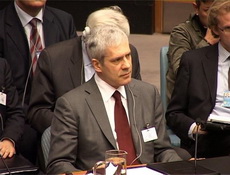Belgrade/New York, March 23, 2009 – Serbian President Boris Tadic called on UN and EU missions to completely carry out their mandate in Kosovo and also invited those UN members that have not recognised the province’s independence to remain so until the International Court of Justice (ICJ) offers its opinion on the legality of this secession.

Speaking at a UN Security Council session today examining the situation in Kosovo-Metohija, Tadic said that none of the states should prejudice the ICJ’s decision and that no new recognitions of the so-called independent Kosovo should be encouraged.
Serbia advocates new negotiations, as only they can provide a just, compromise and mutually acceptable solution. Serbia will never recognise Kosovo-Metohija’s independence directly or indirectly and will continue its diplomatic, peaceful and legal battle in defending its integrity, Tadic said.
Serbian authorities are sure that the ICJ’s decision will be of extreme importance for the UN as it will prevent Kosovo from serving as a dangerous precedent in all parts of the world where secessionist inclinations exist, he said.
Serbia will contribute to the stability of Kosovo by cooperating with UNMIK and EULEX, he said and called on Pristina not to oppose the will of the international community and the UN Security Council when the implementation of the six-item plan is concerned.
He repeated that Serbia is making serious negotiating efforts so that the plan can be implemented in accordance with UN Security Council Resolution 1244 and international law.
Serbia is ready to continue negotiations on all levels with UN representatives and with the support of EULEX, said Tadic.
Without UNMIK it is not possible to fully implement the provisions of either UN Security Council Resolution 1244 or the six-item plan of Ban Ki-moon, Tadic said.
It is UNMIK’s duty to be part of the Pristina delegation in all international and regional meetings, where Pristina can be represented only under the name UNMIK/Kosovo, the Serbian President stressed.
He recalled that Serbia will accept the reconfiguration of the international presence in the province only if it is in accordance with Resolution 1244.
Tadic explained that the EU mission must not be based on the Ahtisaari plan, as it has been endorsed neither by Serbia nor the UN Security Council.
Tadic added that Serbs in Kosovo are not provided security, freedom of movement, justice, electricity and water and therefore the situation in the field is not in line with the UN Secretary General’s report.
Tadic recalled that this winter Pristina authorities cut off power supply to Serbs from Silovo in order to make them pay off their electricity bills to the so-called Republic of Kosovo and therefore indirectly recognise this illegal state, adding that this is the best possible example of the fact that Serbs in Kosovo are the most endangered ethnic group in Europe, living constantly under strong pressures.
I would like to point out that UNMIK and EULEX must enable Serbian democratic officials to enter the whole of Kosovo-Metohija. The Pristina authorities must not stop them at the Kosovo administrative line any more, as it brings unrest among Serbian citizens in the province, said Tadic.
The President demanded that the UN and EU missions make justice accessible to everybody, regardless of their ethnic or religious affiliation.
We are very well aware that 13 months after the unilateral declaration of Kosovo independence there is no state in Kosovo, concluded Tadic, reiterating that human rights protection in the province is not at a high level, as there are only a small number of Serbs and other IDPs in Kosovo-Metohija.
Speaking about the 10th anniversary of the beginning of the NATO bombing of Yugoslavia, the President told the UN Security Council session that Serbia must never again find itself in a situation in which its citizens are being punished and murdered, adding that the international community must understand that the price of misguided politics must never be paid by innocent lives.
Tadic recalled that Yugoslav citizens were collectively charged and bombarded because of the alleged exile of 800,000 Albanians from Kosovo-Metohija, but when the international community’s rule over the province was established, as many as 200,000 Serbs left the province.
Serbs were punished with bombs ten years ago and now, ten years later, Kosovo Albanians are rewarded for exiling Serbs from the province and burning their houses and churches by having over 50 countries recognise the province’s illegal independence, stressed the President.
He recalled that tomorrow is the 10th anniversary of the beginning of the NATO bombing of Yugoslavia and presented the data on the number of killed and wounded in the bombing, as well as the collateral damage.
Tadic noted that on principle Serbia condemns every war crime and is convinced that all perpetrators must face justice.
It is our principled stance that every criminal is a person with a first and last name and that there can be no collective guilt of a people or a state. The recent Hague tribunal’s sentence to specific persons, four former Yugoslav officials and a Serbian official, showed that there is no collective guilt on behalf of Serbia or its citizens, the President emphasised.
We can debate whether the sentences were too harsh or not, but we cannot deny that the tribunal prosecuted specific persons and thus removed the anathema from an entire people, said the President.
This is why Serbia remains committed to full cooperation with the Hague tribunal and will do all it can to apprehend and extradite the two remaining indictees still at large, Ratko Mladic and Goran Hadzic, Tadic concluded.

















